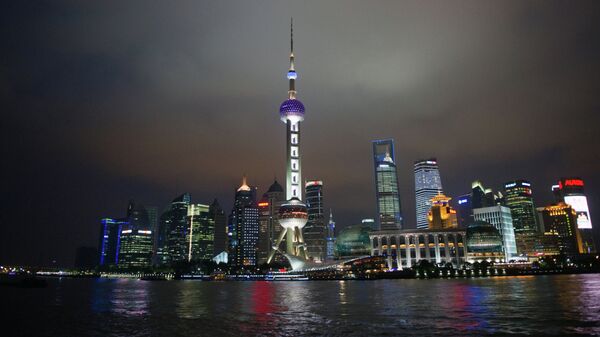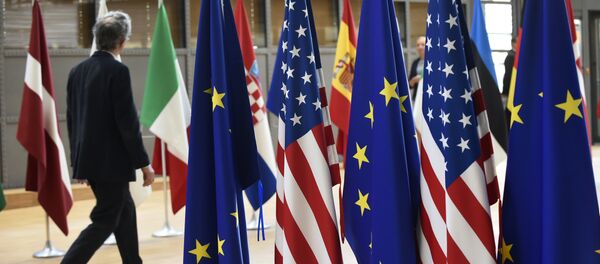Donald Trump's barriers to Chinese investments and mergers with US high-tech companies could prompt China to redirect its funds to its domestic market, Europe and more than 60 countries within the framework of the "One Belt, One Road" initiative.
"[Chinese] enterprises that planned to invest in the US would be able to increase their investments in China," Mei Xinyu, an associate researcher at the Chinese Academy of International Trade and Economic Cooperation, told Sputnik China. "As for the possibility that the free funds will flow to the markets of other states, we must still study the needs of these states and assess their market conjuncture."
Heath Tarbert, assistant Treasury secretary for international markets and investment policy, announced on April 19, that the White House is considering an invocation of the International Emergency Economic Powers Act (IEEPA) to restrict Chinese investments and purchases of US high-tech firms. The legislation, adopted in 1977, was previously used to target "rogue regimes" and terrorist groups.
Mei recalled that in 2017 "China applied restrictive measures by barring a number of irrational investments in the US."
"However, today China has already begun to ease the measures that it adopted last year; as a result, the volume of direct Chinese investments abroad has resumed its growth," the Chinese academic highlighted. "On the other hand, the US government restrictions imposed on investments of Chinese enterprises and operations for the absorption and merger of high-tech enterprises have come into effect."
According to Xu Feibiao, analyst at the Center for World Economy Studies of the China Institute of Contemporary International Relations, "the peak of Chinese investment in the US was attained in 2016, exceeding the unprecedented mark of $40 billion."
The analyst explained that due to a series of regulations adopted by Beijing in 2017 to tackle economic problems, Chinese investments in mergers and acquisitions in the US market have decreased to $20 billion.
"In the next three years, measures aimed at preventing risks will be one of China's main tasks; the regulation of investments could also be continued, therefore, the trend towards reducing investments in the US will remain in place," Xu presumed.
The Chinese analyst emphasized that not only the US but also European states have recently targeted Chinese investments in mergers and acquisitions. "The EU has even gone so far as to adopting a new framework regulating foreign investments," Xu pointed out.

How Chinese Investors May Find Way Out
According to the analyst, Washington's crackdown against Chinese investors would not hit them hard, as they could invest in more than 60 states involved in the Beijing-led ambitious "Belt and Road" project.
"These countries urgently need investments from Chinese enterprises," he remarked. "In addition, the needs of the infrastructure and energy markets are enormous."
On the other hand, European states could soon turn to China, being frustrated by Trump's protectionism, Xu opined.
"As for [Chinese] investments in the merger and absorption of high-tech enterprises, Europe still has a great interest in attracting Chinese funds," he said. "Chinese investments in European companies' assets could grow as the European's trust in US protectionism weakens."
Trump's Trade Policies Hamper Economic Growth
Meanwhile, speaking at the 2018 International Finance and Infrastructure Cooperation Forum held jointly by Bloomberg L.P. and the China General Chamber of Commerce-US (CGCC) in New York, prominent American businessman and politician Michael Bloomberg emphasized that being longstanding trade partners, the US and China should focus on cooperation rather than on trade wars.
"This forum comes at a critical juncture in the US as leaders in Washington are considering new trade policies that would hamper economic growth and strain ties with nations around the world, including China," Bloomberg said, as quoted by Xinhua.
Following the introduction of additional tariffs on steel and aluminum imports, the Trump administration has threatened new measures that envisage taxes of more than $150 billion on Chinese goods. For its part, Beijing has adopted retaliatory steps affecting American imports.
According to The New York Times, the latest restrictions proposed by the Treasury Department on April 19 may significantly limit American partnerships with Chinese companies abroad, most notably in the high-tech sphere.
The views and opinions expressed by the contributors do not necessarily reflect those of Sputnik.








